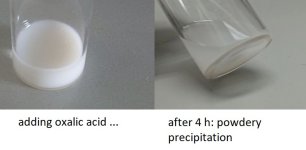Originally I was having way too much headache about the conclusion of my Salt Evaporation Experiments! But that riddle is now solved!!
I tried to find out why the heck salts of tryptamines still evaporate quite easily. So
some tests were performed sequentially. All of the tests showed that after heating and melting the salt, the vapor formed at > 170 °C will contain
both the Tryptamine AND the acid. Now after doing more tests it showed that this vapor is not caustic (neither to pH indicator nor to the lungs) nor does it have the classic tryptamine burn in your mouth.
All of that just pointed towards the vapor still containing Tryptamine+H(+) and acid anion(-). But how the hell can charged molecules evaporate? That would be restricted by the potential energy going into infinity because of the electric charges.
Now the solution is just simple and elegant and easy to understand from the vaporization of Freebases explained
here. That is the true reason why FREEBASE of nearly all Tryptamines will evaporate just below 200 °C.
But now when I take this to the salt variants of those Tryptamines I can see the same pattern. And this is also the final puzzle piece why Variant C is correct:
Evaporation of both salt components in their charged state.
But now after all of these experiments with tryptamines and tryptamine salts I think there is quite some pattern to be found from all the empiric data and this is added as some chemical philosophy at the end of the
summary.
Adding upon on this I have the feeling that there is an ubiquitous temperature at which Tryptamines start exhibiting this evaporation behaviour through aerosolizing (if that is an english word??). This process is nearly unaffected by the actual chemical formula, only by addition of functional groups with extreme increase of boiling point (like R-OH) the aerosolizing temperature is shifted a little further, but still pretty close to the original temperature. And this temperature is roughly 170 °C.
Now even more as an odditiy, yet observed across all the samples measured within that time this process can be even triggered with the respective salts of those tryptamines! The compound only has to react with a compatible acid (Benzoic acid or alkane acids, although first one preferred) which can also evaporate instead of combust.
If this is given, then ANY Tryptamine will evaporate at latest 200 °C being freebase or benzoic acid salt, unless it has some unusual groups like R-OH, but then still showing evaporation below 250 °C, which is still "nearly the same" when compared to the real boiling point.
It is just a conclusion based on empiric data, but soon I will post some evaporation data about Mescaline. And here the exact same pattern is shown. Mescaline contains 3x Ether groups and has a much more polar -NH2 (compared to -NMe2). Still it show EXACTLY the same evaporation again, when paired with a suitable Acid.
More precisely Mescaline Benzoate basically shows the exact same evaporation like DMT Benzoate, even though it's boiling point must be way higher.
Even more demonstrating this "ubiquitous aerosolizing temperature" I will show some data of Mescaline Fumarate. It has a much higher melting point of around 190 °C (nicely showing that Di-Valent salts need a higher energy to surpass crystal lattice energy for starting melting process than 1:1-type salts, which are all at 130-160 °C measured so far) and INSTANTLY starting to vaporize again as soon as it liquifies.
This shows in my eyes that there is simply a
magic temperature at which this aerosolizing effect is happening, pretty much equalizing the temperature to smoke most alkaloid drugs regardless of Freebase or Benzoic Acid salt.
To verify it with "unusual alkaloids" for smoking, I simply smoked 40 mg Meskalin Benzoate which worked great with no combustion, super smooth vapor and my device completely clean afterwards at ~ 200 °C. Effect was simply not too strong, but this amount was less than 10 % of a dose considered moderate when eaten orally. So was definetly interesting and a good demonstration.
Now as thinking loudly this even opens up possibilities of smoking basically any psychedelic after
conversion to the Benzoate Salt at up to 200 °C. Still this would need strong accordance to any safer-use rules possible ...


 But if it works like a charm then people should use that one instead, less toxic and better smell of course. Would be then just also a safety factor to put inside of the freezer, but people could just form crystals at room temp and then see if even more is coming at - 20 °C.
But if it works like a charm then people should use that one instead, less toxic and better smell of course. Would be then just also a safety factor to put inside of the freezer, but people could just form crystals at room temp and then see if even more is coming at - 20 °C.




